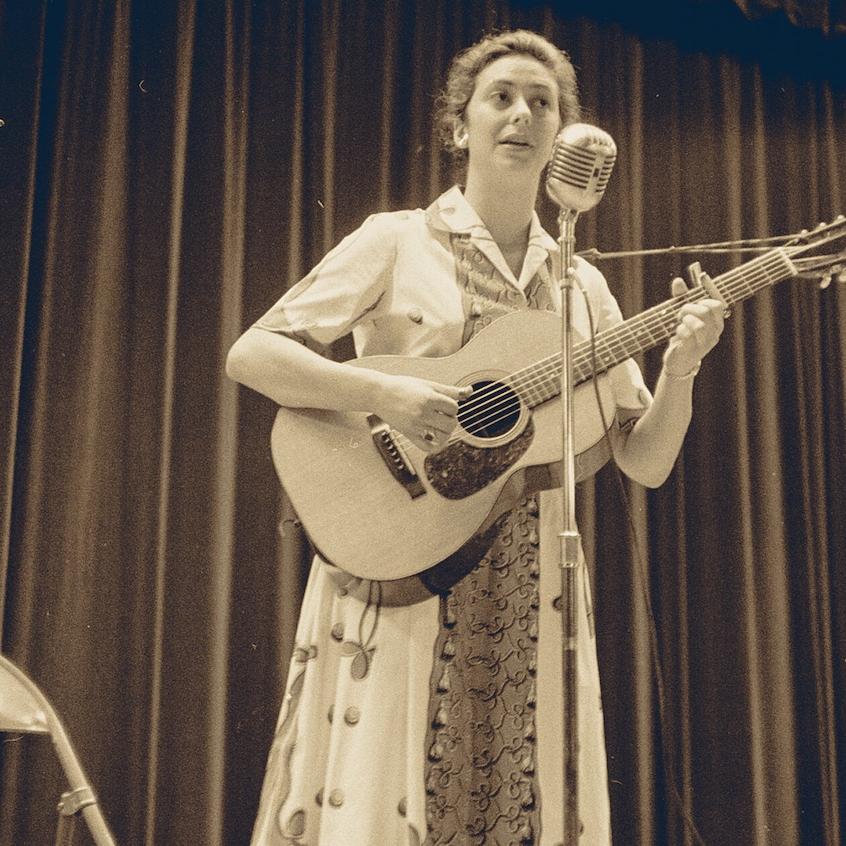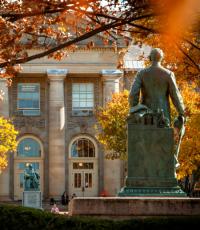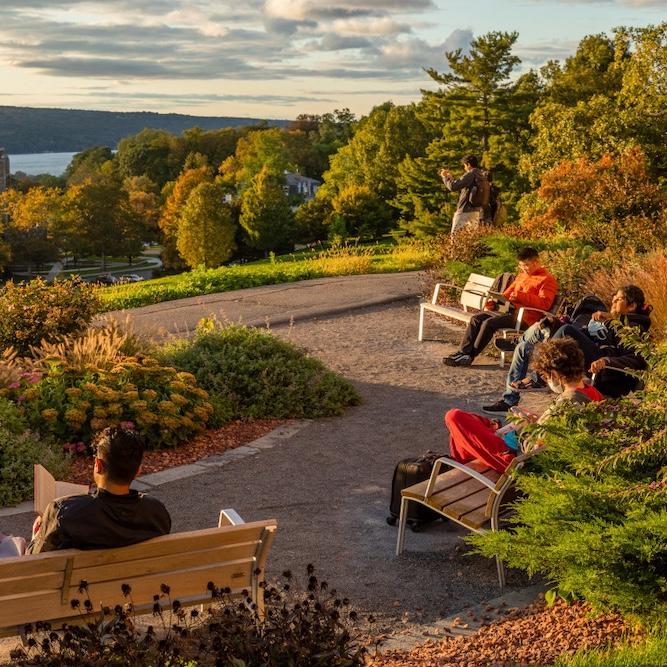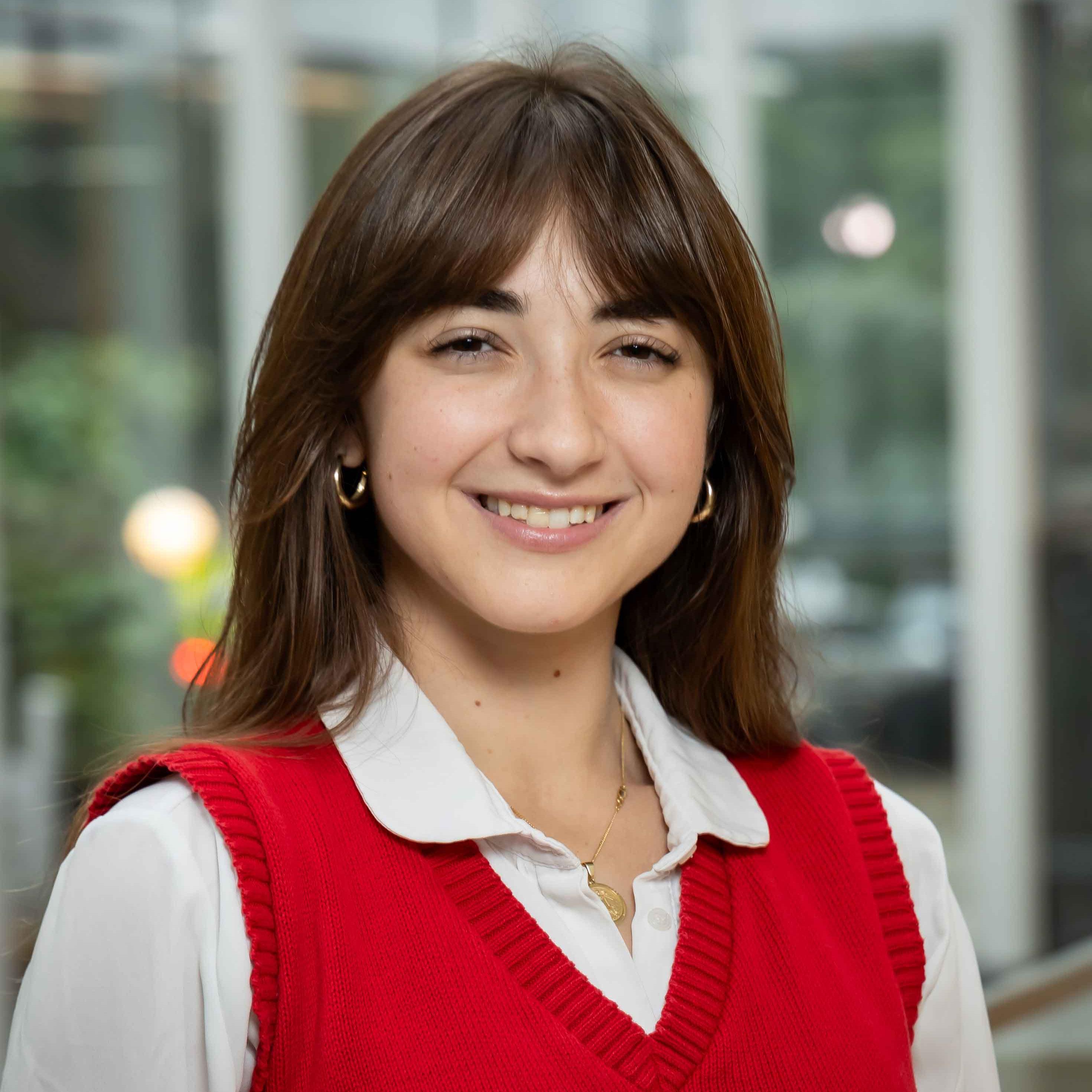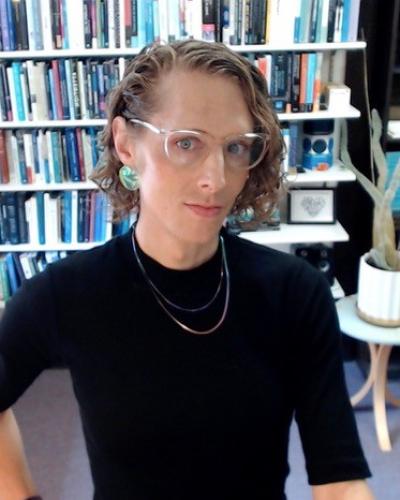From their mood-matching earrings to their walls lined with life – books, posters, and pictures alike – organized chaos fills the office and spirit of Professor Willow Starr. An accomplished philosopher of language, social philosopher, cognitive scientist, and mathematician with a full roster of other interests and experiences behind them, Professor Starr reflects on having “gotten deeply into a number of different things at different stages of [their] life.” “With each practice,” says Starr, “comes a different group of people and a different kind of culture, and so I am constantly cycling back to those things.” Starr points to art, music, DJing, radio hosting, and website design as formative engagements, which were central to their identity in college but are now more peripheral.
Starr finds, however, that they are still inspired by those communities as models of education and communication. In particular, they remember the alternative communities of their youth and the disorientation of starting school. They recall, on the one hand, the “intense hierarchy” of the public-school sphere and “the way in which students' needs were not factored into the way that education was crafted,” as an experience which made philosophy especially appealing to them. “Philosophy itself,” says Starr, “has the seeds of this alternative conversational culture that I think is of some value.” That is, philosophy encourages us to “engage ideas in an intense and critical way without engaging people in an intense and critical way.”
On the other hand, Starr notes that their pursuit of an intellectual life has never confined them to academia, both as an aspect of their own person and because of their models throughout school and in their personal life. Starr reflects gratefully on high school teachers, who pushed the idea of an intellectual life, and on their mom, who they describe as “this incredibly curious and passionate person.” “[My mom] was always learning new things and reading new things, and we always had a ton of books around,” Starr says, “So, for that reason, I feel like she in some ways charted the path for me. I’m now doing it within the harbor and privilege of the university and as my main occupation, but it was something that she modeled for me.”
Starr points, too, to social media and other forms of anonymous or casual discourse as viable outlets for the pursuit of an intellectual life and open conversation. “The really disruptive and exciting ideas happen when we step outside of [the narrow questions] and try to understand how things fit together in a bigger way,” says Starr. “From volunteering at food pantries to visiting local farms to cooking meals together” any of these, Starr encourages as ways for people to, “actively engage in the theoretical, philosophical ideas in a way that they can transport to their ordinary social lives.”
For Starr’s part, they list community building and activism around food access, gender equality, and racial justice as projects which are informing their current work. “The projects I have in my social life allow me to see that I have stakeholders in my own research outside of academia… There was definitely a stage in my career where that was not true,” Starr reflects, “And, I guess I see that past work as valuable knowledge production, but not something that I can wake up every morning feeling like I have to do.”
Professor Starr references two inspirations for this shift, the first of which comes from the projects and principles of people near to them. From their current spouse – Sarah Murray, Associate Professor of Linguistics at Cornell – they’ve, “taken a lot of inspiration from the work that [Murray] has done in the local community she works with… in building local community surrounding language revitalization and supporting what they identify as their goals rather than instituting the goals of a kind of academic enterprise.” And, from their colleague, Kate Mann, they’ve been motivated to engage in “public facing philosophy that speaks to the pressing moral issues of the time.”
Starr’s other inspiration for engaging people and ideas outside of the academy through their writing comes from the ties of their identity. Through their experiences as a first-generation college student, Starr finds it necessary and valuable to recognize the public as an investor in the knowledge produced by academia. More pressingly, Starr cites their experiences as a trans person amid increasing politicization of the trans identity as a tie that they cannot ignore. “It’s not a voice I can silence,” says Starr, “It’s an accountability that I have as a part of who I am that has to inform the kind of philosophy that I do.”
Starr’s current book project, “Norms of Communication,” is thus working from a framework that explores the way that communication goes wrong, not as “isolated events in which irrational biases take over,” but as “the kind of drumbeat of communication… social norms and social organization that produce that as an outcome.” In small groups, like those exhibited by monkeys, “reputation is enough, so they just stop listening [to monkeys that repeatedly give false signals],” Starr says, “but, in societies like ours that are massively parallel organized… reputation is not enough.” So, people have developed social norms to maintain reliable communication, social norms which are important to see as two dimensional. “We can’t treat oppressive communication as exceptional,” says Starr, not without being “less thorough in interrogating the way ordinary communication works” as a result.
Looking on the bright side, Starr emphasizes that, “the cultural norms by which we communicate are not inevitable and are something that can be changed and cultivated and something in which we have evidence of positive change in many domains already.” They cite the increased acceptance of discussions revolving around issues of social justice, many of which were barred by the social practices of just a decade or two ago, and the inclusion of diversity in commonly consumed media as points of hope. In their work and in the cultivation of a more accepting, conversational world, they describe the process of search and discovery as a difficult, but necessary one. It is important to seek a world which allows for the “constant refinement of ideas and discovering that ideas or insights that you were at some point really attached to didn’t really come together.” We need to be allowed the opportunity to move on from social practices that are no longer serving us, and the visibility of those who are negatively impacted seems a good place to start. “And so,” Says Starr, “every time we interact with another person, we have an opportunity to be part of a shift in the right direction rather than the wrong one.”

